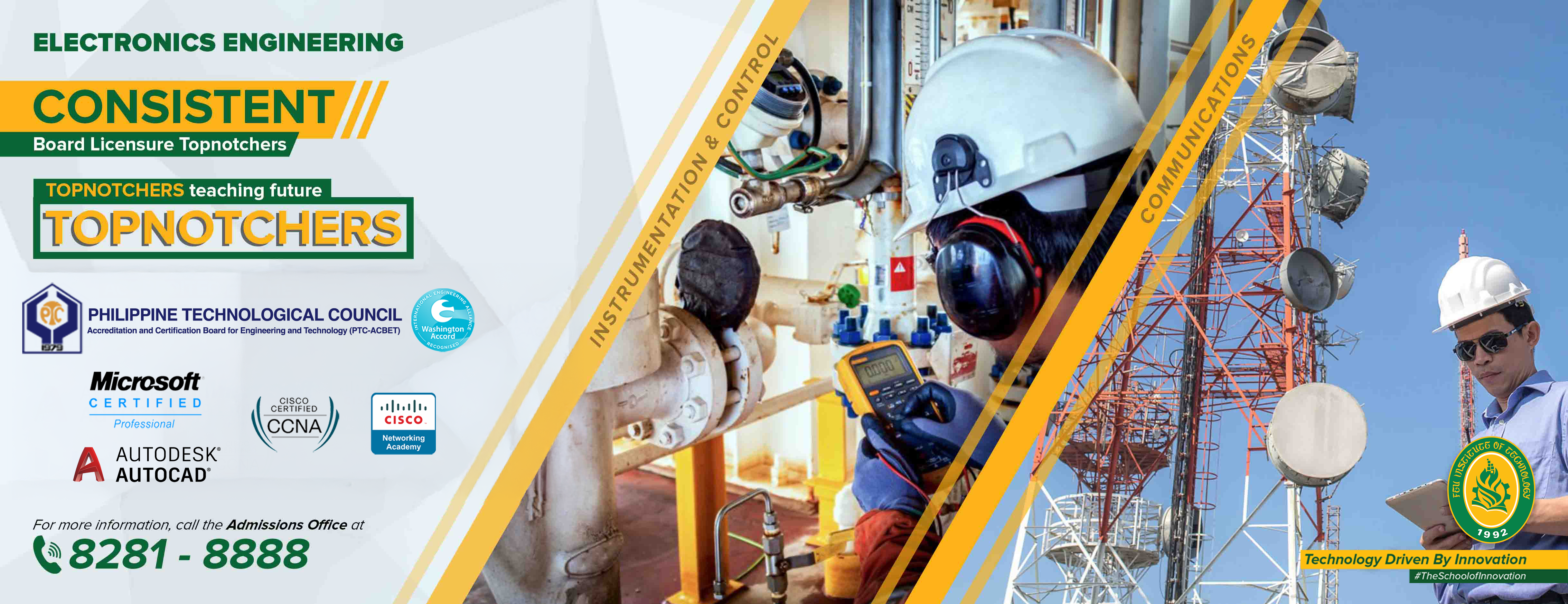We use cookies to analyze traffic and improve your overall experience.

Electronics Engineering (ECE) is a dynamic program that prepares its graduates to be in the forefront of the revolutionary electronics and communications technology. The Electronics Engineering program forms the foundation for various growing disciplines leading to specializations in a desired subfield with the help of a research-oriented curriculum. With the global popularity of this branch and its increasing demand and career opportunities, the ECE Program takes special care in acquainting the students with the latest developments in the field and preparing them for the licensure examinations. Electronics Engineering covers topics such industrial electronics, broadcast engineering, cable and wireless television systems, consumer and industrial electronics, optics/ photonics/optoelectronics, electromagnetics, avionics, aerospace, navigational and military applications, medical electronics, robotics, cybernetics, biometrics, fire alarms, CCTV, sensors and detection systems, microelectronics and all other related and convergent fields.
FEU Tech’s educational philosophy is rooted in transformative learning, emphasizing innovation, relevance, and social responsibility. We aim to cultivate an ecosystem of learning that shapes the next generation of leaders and innovators, driving positive change both locally and globally.
Three to five years after graduation, the Electronics Engineering alumni shall have:
These are the skills and qualities our engineering graduates will have when they finish the program.
The Program offers track electives in the following areas:
Focuses on introduction to advanced communication systems to include study on microwave technology, satellite systems, fiber optic communication systems, advanced signal processing, spectral analysis, noise reduction, principle and applications of telephone systems, telephone engineering, cellular mobile systems, electronic aids to navigation, fundamentals of broadcasting (AM, FM, TV broadcast) and acoustics.
Focuses on introduction to advanced instrumentation and control systems to include study on communications instruments, linear and non-linear systems, digital control system analysis and design, stability, model reference adaptive control, recent trends and applications of adaptive control, optimal control, mathematics of robot manipulation, robot workspace coordinate transformation, robot sensory devices and multi-robot cooperative systems.
Graduates are expected to be competent engineers in:
Broadcasting
Telecommunications
Semiconductor Device Fabrication / Manufacturing
Electronics Design
Computer Systems
Instrumentation and Telemetry
Automation, Feedback, Process Control, Robotics and Mechatronics
Industrial Electronics
Signal Processing
Optics
Medical / Biomedical Electronics
Laboratories are an essential element of the curriculum which is why the department is equipped with several laboratories to enhance and develop the skills of students in the field of Electronics Engineering. The institution always ensures that the available equipment and supplies are adequate to make the learning environment advantageous for students.
The laboratory rooms comply with the standard size requirements and are equipped with proper ventilation and lighting. Provisions for safety measures are available such as safety signs for precautions, first aid kits, in response to emergency situations, and fire extinguishers in case of fire. Emergency lights and spacious corridors also exist in cases of evacuation. All equipment are well-organized and ready to be used by students to meet the requirements of the course.
The Electronics Laboratory room has a floor area of 90.84 m² capable of handling 40 students and allowing adequate space of approximately 2.3 m² per student. Electronics laboratory classes and Logic classes are held in this room. Using Multisim and Digital trainers, students learn the practical applications and simulation of circuit laws and theorems.
The Instrumentation and Control Systems laboratory has a floor area of 90.84 m² capable of handling 40 students giving adequate space of approximately 2.3 m² per student. Industrial electronics laboratory classes are held in this room. Using PLC Siemens modules, students learn about applications for instrumentation and control systems.
The Communications Laboratory has a floor area of 64 m² capable of handling 20 students giving adequate space of approximately 3.2 m² per student. Communications Laboratory classes are held in this room. Using Leybold, Timms, and Feedback Modules along with auxiliary devices such as oscilloscopes and function generators, students learn the practical application of communication laws and theorems.
The Computer Room has a floor area of 108.95 m² capable of handling 40 students giving adequate space of approximately 2.7 m² per student. Computer Laboratory classes are held in this room. Using MATLAB, students learn the simulated application of numerical methods, feedback and control systems, signals, spectra and signal processing, and other professional courses.
BSECE, Mapua Institute of Technology
BSEE, Mapua Institute of Technology
MEP-ECE, De La Salle University- Manila
Doctor of Technology, Technological University of the Philippines
Specialization/Research Area: Communications Systems, Engineering Education, Electromagnetics
ASEAN Engineer
ASEAN Chartered Professional Engineer
Professional Electronics Engineer
Registered Electronics Engineer
Registered Electrical Engineer
Professional Teacher
Affiliation: IIEE, IECEP, MRSP, ASEE
BSECE, Technological Institute of the Philippines – Manila
MSECE, De La Salle University Manila
PhD ECE, De La Salle University Manila
Specialization/Research Area: Wireless Communications, Channel Modeling, Radio-Wave Propagation
Registered Electronics Engineer
Affiliation: IECEP, IEEE, IAENG
BSECE, FEU Institute of Technology
MSECE (candidate), Mapua University
Specialization/Research Area: Control Systems
Registered Electronics Engineer
Registered Electronics Technician
Affiliation: IECEP
BSECE, De LaSalle University – Manila
MSECE (candidate), Mapua University
Specialization/Research Area: Control Systems, Electronics
Registered Electronics Engineer
Affiliation: IECEP
BSECE, FEU Institute of Technology
MSECE, De La Salle University Manila
Specialization/Research Area: Communication Systems
Registered Electronics Engineer
Registered Electronics Technician
Affiliation: IECEP
BSECE-Central Colleges of the Philippines
MEP-ECE, De La Salle University- Manila
PhD-ECE, De La Salle University- Manila
Specialization/Research Area: Machine Learning/Artificial Intelligence, Computer Vision Intelligent systems, Control Systems
Professional Electronics Engineer
Registered Electronics Engineer
Affiliation: IECEP, IEEE
BSECE, Mapua Institute of Technology
MEP-ECE, De La Salle University - Manila
PhD-ECE (on-going), De La Salle University - Manila
Specialization/Research area: Communication Systems, CISCO
Professional Electronics Engineer
Affiliation: IECEP, IEEE
Office Hours: Monday to Friday
8:00 a.m. ─ 5:00 p.m.
Trunkline: (02) 8281 8888 Local 316
Email: eee@feutech.edu.ph
Program Director of Electronics Engineering